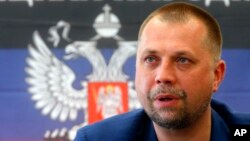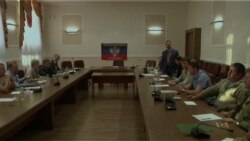A leader of the pro-Russian separatists in eastern Ukraine says rebel forces will observe the unilateral cease-fire that President Petro Poroshenko declared Friday as the first step in a broader peace plan.
Alexander Borodai made the announcement in Donetsk, where talks opened Monday between rebel leaders and representatives of the Ukrainian government. Borodai, prime minister of the separatists' self-declared Donetsk People's Republic, said the rebels' cease-fire would last until Friday, the same day the government's week-long cease-fire is set to end. He said his side would engage in further talks to end the crisis.
Among those reportedly participating in the Donetsk talks are former Ukrainian President Leonid Kuchma; Russia's Ambassador to Ukraine Mikhail Zurabov; and Viktor Medvedchuk, chairman of the pro-Russian political organization Ukrainian Choice and a close associate of Russian President Vladimir Putin. The talks also include representatives of the separatist Luhansk People's Republic and a representative of the Organization for Security and Cooperation in Europe (OSCE).
Former president Kuchma is representing the current Ukrainian president in the talks, Poroshenko's office said Monday.
On Saturday, the Kremlin quoted Putin as calling for political compromise in Ukraine, saying a peace deal should ensure the rights of all Russian-speaking people in Ukraine's east.
Poroshenko's cease-fire declaration - rejected by separatist leaders - ordered Ukrainian forces to halt all operations for seven days. But he said the order did not mean Ukrainian troops would not fight back if attacked. The Kremlin said Saturday that the Russian leader supported the cease-fire.
Ukraine and Russia have been locked in a tense standoff since late February, when Ukrainian protesters forced their Russian-backed president to flee the country after months of anti-government demonstrations in Kyiv.
Obama calls on Putin
Meanwhile, the Kremlin said Putin discussed the Ukraine crisis with President Barack Obama on Monday by telephone. It said the Russian president stressed the need for "a real cessation of hostilities and the start of direct negotiations between the opposing sides."
White House spokesman Josh Earnest told reporters that "the president spoke to President Putin and once again urged him to support peace instead of allowing the provision of arms and materiel across the border and continuing support for militants and separatists who are further destabilizing the situation in Ukraine.''
The White House said Obama told Putin Russia will face additional costs if there are no concrete actions to de-escalate the Ukraine situation.
The U.S. has already threatened sanctions on Russia's financial, defense and high-tech industries as more Russian military equipment has flowed into Ukraine, and has stepped up talks with Europe over imposing similar measures.
Click here to read about Vice President Biden's phone call to President Poroshenko Sunday.
EU sanctions
Earlier Monday, European foreign ministers threatened to impose further sanctions on Russia if it fails to comply with Poroshenko's peace plan.
British Foreign Secretary William Hague said European Union leaders will be ready to decide on wider sanctions at a summit in Brussels on Friday.
Swedish Foreign Minister Carl Bildt said there are "no signs" Moscow is preventing armed fighters and weapons, including tanks, from being sent from Russia to the separatists in eastern Ukraine. He accused Russia of conducting "a propaganda war with full speed ahead."
In a joint statement, the EU foreign ministers called on Putin to pull back Russian forces from the Ukrainian border.
The EU and the United States have thus far refrained from imposing economic sanctions more broadly on the Russian economy and instead relied on the specific sanctions that were imposed against certain individuals and companies after Russia’s annexation of Crimea.
Poroshenko's cease-fire declaration - initially rejected by separatist leaders - ordered Ukrainian forces to halt all but defensive operations for seven days. The Kremlin said Saturday that Putin supports the cease-fire.
Ukraine and Russia have been locked in a tense standoff since late February, when Ukrainian protesters forced then-president Viktor Yanukovych to flee the country after months of anti-government demonstrations in Kyiv.
WATCH: Related report from VOA's Zlatica Hoke
Alexander Borodai made the announcement in Donetsk, where talks opened Monday between rebel leaders and representatives of the Ukrainian government. Borodai, prime minister of the separatists' self-declared Donetsk People's Republic, said the rebels' cease-fire would last until Friday, the same day the government's week-long cease-fire is set to end. He said his side would engage in further talks to end the crisis.
Among those reportedly participating in the Donetsk talks are former Ukrainian President Leonid Kuchma; Russia's Ambassador to Ukraine Mikhail Zurabov; and Viktor Medvedchuk, chairman of the pro-Russian political organization Ukrainian Choice and a close associate of Russian President Vladimir Putin. The talks also include representatives of the separatist Luhansk People's Republic and a representative of the Organization for Security and Cooperation in Europe (OSCE).
Former president Kuchma is representing the current Ukrainian president in the talks, Poroshenko's office said Monday.
On Saturday, the Kremlin quoted Putin as calling for political compromise in Ukraine, saying a peace deal should ensure the rights of all Russian-speaking people in Ukraine's east.
Poroshenko's cease-fire declaration - rejected by separatist leaders - ordered Ukrainian forces to halt all operations for seven days. But he said the order did not mean Ukrainian troops would not fight back if attacked. The Kremlin said Saturday that the Russian leader supported the cease-fire.
Ukraine and Russia have been locked in a tense standoff since late February, when Ukrainian protesters forced their Russian-backed president to flee the country after months of anti-government demonstrations in Kyiv.
Obama calls on Putin
Meanwhile, the Kremlin said Putin discussed the Ukraine crisis with President Barack Obama on Monday by telephone. It said the Russian president stressed the need for "a real cessation of hostilities and the start of direct negotiations between the opposing sides."
White House spokesman Josh Earnest told reporters that "the president spoke to President Putin and once again urged him to support peace instead of allowing the provision of arms and materiel across the border and continuing support for militants and separatists who are further destabilizing the situation in Ukraine.''
The White House said Obama told Putin Russia will face additional costs if there are no concrete actions to de-escalate the Ukraine situation.
The U.S. has already threatened sanctions on Russia's financial, defense and high-tech industries as more Russian military equipment has flowed into Ukraine, and has stepped up talks with Europe over imposing similar measures.
Click here to read about Vice President Biden's phone call to President Poroshenko Sunday.
EU sanctions
Earlier Monday, European foreign ministers threatened to impose further sanctions on Russia if it fails to comply with Poroshenko's peace plan.
British Foreign Secretary William Hague said European Union leaders will be ready to decide on wider sanctions at a summit in Brussels on Friday.
Swedish Foreign Minister Carl Bildt said there are "no signs" Moscow is preventing armed fighters and weapons, including tanks, from being sent from Russia to the separatists in eastern Ukraine. He accused Russia of conducting "a propaganda war with full speed ahead."
In a joint statement, the EU foreign ministers called on Putin to pull back Russian forces from the Ukrainian border.
The EU and the United States have thus far refrained from imposing economic sanctions more broadly on the Russian economy and instead relied on the specific sanctions that were imposed against certain individuals and companies after Russia’s annexation of Crimea.
Poroshenko's cease-fire declaration - initially rejected by separatist leaders - ordered Ukrainian forces to halt all but defensive operations for seven days. The Kremlin said Saturday that Putin supports the cease-fire.
Ukraine and Russia have been locked in a tense standoff since late February, when Ukrainian protesters forced then-president Viktor Yanukovych to flee the country after months of anti-government demonstrations in Kyiv.
WATCH: Related report from VOA's Zlatica Hoke







